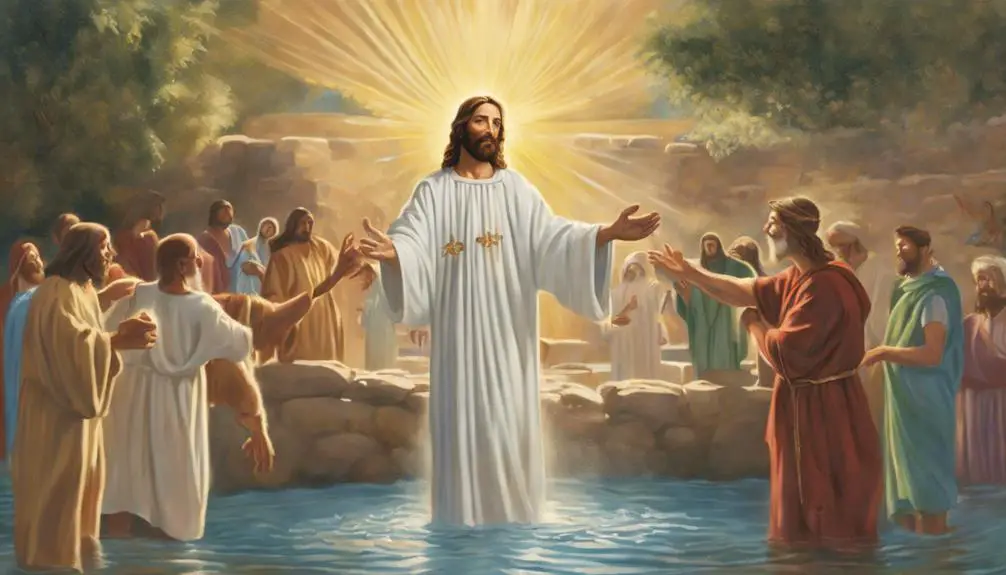Begin your spiritual journey by exploring the profound questions surrounding Matthew 3:13-17, diving deep into Jesus' baptism and its relevance to our faith today.

Matthew 3:13-17 Bible Study Questions
Just like a detective unravels a mystery, let's try to comprehend the profound verses of Matthew 3:13-17, where we witness Jesus' baptism by John the Baptist.
What's the significance of Jesus coming to John for baptism?
Why does the Holy Spirit appear as a dove?
How does the voice from heaven affirm Jesus' divine sonship?
As you ponder these questions, you'll unearth the depth of these verses and their relevance to our faith journey today.
So, are you ready to embark on this spiritual exploration?
Key Takeaways
- Understanding Jesus' baptism as an act of humility, obedience, and the start of his public ministry.
- Exploring the significance of the dove and voice during Jesus' baptism.
- Analyzing the theological implications of Jesus' baptism, including the manifestation of the Trinity.
- Reflecting on personal faith journeys, inspired by Jesus' commitment and divine affirmation in Matthew 3:13-17.
Contextual Background of Matthew 3:13-17

Diving into the contextual background of Matthew 3:13-17, you'll quickly realize that this significant passage marks a pivotal moment in the New Testament narrative. It's the introduction of Jesus' public ministry, initiated by His baptism by John the Baptist in the Jordan River.
The preceding verses detail John's ministry of repentance and baptism, setting the stage for Jesus' arrival. John's prophetic role was to 'prepare the way' for Jesus (Matthew 3:3), and his baptism practice was an outward symbol of inner repentance and transformation.
When Jesus appears on the scene, it's a shock to John, who feels unworthy to baptize Him (Matthew 3:14). Yet, Jesus insists, marking an important act of obedience and humility.
This baptism is also noteworthy for the divine affirmation that follows. As Jesus emerges from the water, heaven opens and the Spirit of God descends like a dove, while a voice from heaven confirms Jesus' divine sonship (Matthew 3:16-17). This moment not only validates Jesus' ministry but also publicly reveals the Trinity for the first time.
Understanding the context helps you appreciate the gravity of this moment, as it sets the stage for Jesus' earthly ministry and the profound theological implications that follow.
Understanding Jesus' Baptism

To fully grasp the significance of Jesus' baptism, it's vital to delve into the nuances and implications of this monumental event in the New Testament. As you study Matthew 3:13-17, you'll find layers of meaning that speak to both the humanity and divinity of Jesus.
Here's a table that breaks down some key aspects of Jesus' baptism:
Aspect |
Biblical Text |
Implication |
|---|---|---|
Jesus' Humility |
Matthew 3:14-15 |
Jesus' willingness to be baptized by John, his cousin, showcases his humility. |
Fulfillment of Righteousness |
Matthew 3:15 |
Jesus' baptism fulfills all righteousness, indicating his obedience to God's will. |
Affirmation from Heaven |
Matthew 3:17 |
God's voice from heaven affirms Jesus' divine sonship and his pleasure in him. |
Through this, one can see how Jesus' baptism serves as a model and a message. It is a model of humility and obedience, and a message of his divine sonship. It's an event that signifies the start of Jesus' public ministry, and sets the tone for his teachings and miracles. The profound depth of Jesus' baptism invites you to reflect on your own baptism, your faith journey, and your relationship with God.
Significance of the Dove and Voice

In examining the significance of the dove and voice during Jesus' baptism, you'll uncover symbolisms that further illuminate the divine affirmation of Jesus' ministry. The dove, descending upon Jesus, is a poignant symbol of the Holy Spirit. This isn't a random choice of representation. In biblical times, doves were seen as pure and innocent creatures, traits often associated with the Holy Spirit. By appearing as a dove, the Spirit's purity and peace were emphasized, not to mention the affirmation of Jesus' sinless nature.
The voice from heaven, on the other hand, added an auditory dimension to the sensory experience of the divine presence. This wasn't just any voice; it was the voice of God the Father Himself. The words spoken, 'This is my Son, whom I love; with him I'm well pleased,' served as a divine endorsement of Jesus' ministry. This voice wasn't just for Jesus, but for all present, affirming Jesus as God's beloved Son and setting the stage for His public ministry.
These two elements, the dove and voice, provided a tangible confirmation of the divine nature of Jesus' mission. This wasn't merely a ritual, but a divine revelation.
Theological Implications Explored

Building on the understanding of the dove and voice's significance during Jesus' baptism, let's now explore the theological implications of this profound event. The baptism of Jesus is not just a historical occurrence; it's a moment laden with profound theological meanings.
Theological Principle |
Implication in Jesus' Baptism |
|---|---|
Manifestation of Trinity |
The baptism of Jesus is one of the few incidences where the Trinity is clearly displayed: the Father in the voice, the Son in Jesus, and the Spirit in the dove. |
Validation of Jesus' Ministry |
The voice from heaven saying, "This is my beloved Son," affirms Jesus' identity and validates His ministry. |
Model of Humility |
Jesus' baptism, despite being sinless, models humility and obedience, setting a standard for believers. |
Symbolism of New Life |
Baptism symbolizes dying to old life and rising to new life in Christ, foreshadowing Jesus' death and resurrection. |
Personal Reflections and Takeaways

After delving into the theological implications of Jesus' baptism, let's now turn our focus to the personal reflections and takeaways this profound event offers for us today. As you consider the baptism of Jesus, you're invited to reflect on your own journey of faith.
Just as Jesus willingly submitted to baptism, you're challenged to consider the areas in your life where you need to surrender to God's will. His example encourages humility, obedience, and commitment to God's plan, regardless of the cost.
Next, take note of the divine affirmation Jesus received from His Father, 'This is my beloved Son, in whom I'm well pleased.' This serves as a reminder of God's love for you as a believer, and His pleasure in your dedication to Him.
Conclusion
In wrapping up, you've delved into Matthew 3:13-17, comprehending Jesus' baptism, the dove, and the voice's significance. You've probed theological implications, providing a deeper understanding of this critical Biblical event.
Reflect on these learnings, considering how they enrich your faith and personal journey. The depth of Scripture is vast; continue exploring, questioning, and applying its wisdom.
Remember, every passage holds a transformative power for your spiritual growth.



Sign up